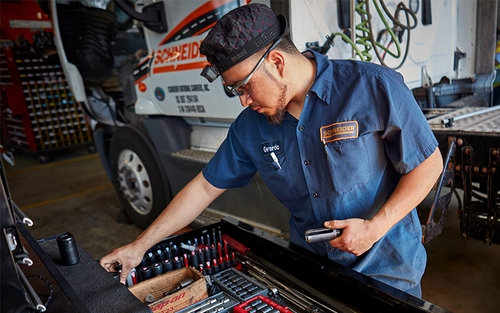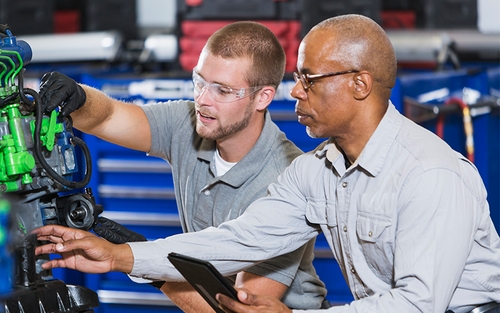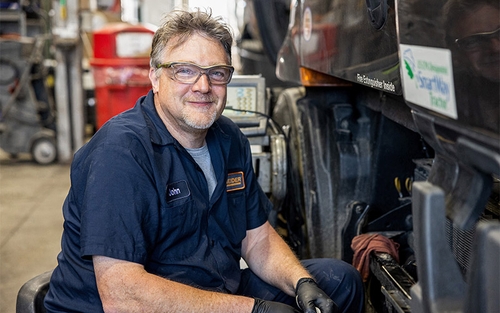Diesel technician vs. auto mechanic: What’s the difference?


By The Schneider Guy
Estimated reading time: 2 minutes
If you love working with your hands and have a passion for vehicles, you'll likely find a career as a mechanic both rewarding and fulfilling. But which type of mechanic role would suit you best?
Let’s explore the differences between a diesel technician versus an auto mechanic to help you make an informed decision.
5 differences between a diesel vs. auto mechanic
1. The types of vehicles they work on.
Auto mechanics
Auto mechanics work with gasoline-powered vehicles, including:
- Cars.
- SUVs.
- Pickup trucks.
Diesel technicians
Diesel technicians specialize in servicing diesel engines found in larger vehicles like:
- Semi-trucks.
- Buses.
- Construction and agricultural equipment.
- Marine vessels.
2. Their job responsibilities.
Auto mechanics
Job duties for an auto mechanic vary based on where the mechanic works and what they specialize in. However, common responsibilities for most auto mechanics include:
- Performing preventative maintenance, including oil changes, tire rotations and fluid level checks.
- Identifying problems using diagnostic tools.
- Repairing and replacing faulty parts, such as brake pads.
- Communicating with customers and providing estimates for repairs.
- Following safety standards and testing vehicles for state emissions.
Diesel technicians
Like auto mechanics, the day-to-day tasks of a diesel technician differ depending on what type of diesel technician they are. Regardless of where they work, job duties for most diesel technicians include:
- Conducting annual inspections according to company and manufacturer guidelines.
- Performing preventative maintenance, such as oil changes, tire rotations and fluid level checks.
- Identifying and diagnosing mechanical issues using diagnostic tools.
- Repairing and replacing faulty parts and components.
- Communicating with customers about repair recommendations.
3. Where they work.
Auto mechanics
Auto mechanics typically work in:
- Automotive repair, tire or parts shops.
- Car dealerships.
- Dedicated service centers.
Diesel technicians
Diesel technicians can work for:
- Trucking companies.
- Semi-truck or heavy-duty equipment dealerships.
- Fleet services.
- Specialty repair shops.
4. The type of education and training they receive.
Auto mechanics
Most employers require automotive mechanics to have at least a high school diploma or GED. From there, they can choose to pursue on-the-job training or post-secondary education to gain the hands-on experience they need.
If they choose to attend a technical college, an auto mechanic will finish a program in automotive technology. Depending on the program they attend, auto mechanics can receive:
- A certificate: Includes hands-on training in specialized areas. Usually takes a few months to one year to complete.
- A technical diploma: Requires hands-on technical training and some general education courses. Generally takes one to two years to complete.
- An associate degree: Involves hands-on technical training and general education courses. Typically takes two years to complete.
Diesel technicians
Like auto mechanics, most employers require diesel technicians to have at least a high school diploma or GED. They can then choose to pursue on-the-job training or post-secondary education.
If they choose to attend a technical college, a diesel technician will enroll in a diesel technology program and earn a certificate, technical diploma or an associate degree. The time it takes to complete each one is the same as an auto mechanic (listed above).
5. The certifications they can get.
Once they complete post-secondary training, auto mechanics and diesel techs can choose to pursue professional certifications from the National Institute for Automotive Service Excellence (ASE). The mechanic or technician must pass a series of tests in order to earn the certification.
Tests for auto mechanics include:
- Engine repair.
- Automatic transmission/transaxle.
- Manual drive train and axles.
- Brakes.
- Suspension and steering.
- Electrical/electronic systems.
- Heating and air conditioning.
Tests for diesel technicians include:
- Diesel engines.
- Drive train.
- Brakes.
- Suspension and steering.
- Electrical/electronic systems.
- Heating, ventilation and air conditioning (HVAC).
- Preventive maintenance.
What certifications a diesel technician needs varies by state and company. However, earning a diesel technician certification can open doors to career advancement and higher earning potential.
What’s the difference between a diesel mechanic and a diesel technician?

Schneider Guy loves the "Big Orange." He's passionate about the trucking industry and connecting people to rewarding careers within it. He's been the eyes and ears of our company since our founding in 1935, and he's excited to interact with prospective and current Schneider associates through "A Slice of Orange."



